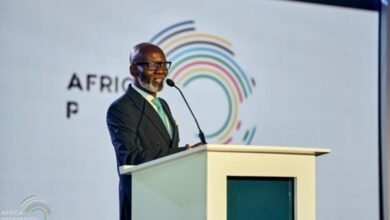Cedric Yamdjeu : “Group together, act, and unite in righteousness to rebuild Africa”
The contribution of the diaspora (3 to 5 million people in France, between 5 and 6% of the total electorate in France) and through remittances (40 billion USD for Sub-Saharan Africa) is considerable. Clearly, African diasporas constitute an economic force, evidenced by the African remittances to their countries of origin, which reached 70 billion dollars (10 billion dollars coming from France). Thus, the African diaspora has money; its utilization is what needs improvement.

By Cedric Yamdjeu*
These funds have become the primary source of external financing, more than double the official development assistance to Africa, which is estimated at 30 billion dollars (including 2.5 billion attributed by France). However, these funds are primarily intended to address social issues such as health, education, housing, and improving living conditions.
Regarding these financial flows, there are regular transfers from migrants to their homes by family members and friends. Sometimes these are personal investments in education, health, financial investments, or businesses. There are also ad hoc transfers for funerals and weddings. Additionally, there are transfers from diaspora groups. These are associations of native villages pooling their funds to invest in something very specific in their hometown or village: these can be more robust projects for schools or farmers.
One way to improve their effectiveness and the role of the diaspora in economically influencing the future of their nations is to effectively capture diaspora financing. It is imperative to multiply initiatives and measures to mobilize diaspora savings to finance projects and SMEs, similar to the Efficience Africa Fund by Club Efficience and the EIC Corporation platform or Jaama Summit, the latest African diaspora investor salon promoting investment.
To facilitate remittances, a law has been proposed in France. It suggests tax exemption for money transfers and a dual banking system (an account in the country of origin and another in the host country). Are these avenues worth exploring?
Firstly, it is extremely rare for remittances to be taxed. Last year, there were discussions about a tax, for example, on remittances in Kuwait, but generally, it is a rarity. Let us not forget that migrants pay taxes on their salaries, at least those working in the formal labor market.
Dual banking, therefore, allows the possibility of opening a bank account both in the country of origin and in the host country. This is particularly interesting given that financial inclusion in Africa is quite low: between 50 and 60% of households in Sub-Saharan Africa. This is very low compared to the rest of the world. The second benefit of dual banking is significantly reducing costs. In Sub-Saharan Africa, remittances currently cost about 8%, whereas the global average is around 5%, with a target of 3%. On this point, the difference between Africa and the rest of the world is considerable.
This diaspora and youth must therefore create heroes, true warriors of development, civil society actors, and genuine industry leaders around the values of humility, excellence, and integrity, both on the African continent and in France. It thus has a role to play in the renewal of French-African relations, fostering a win-win cooperation for genuine, relaxed cooperation. Due to their dual culture (host country and country of origin), diaspora members are the best ambassadors of the two continents, true bridges between Africa and France.
Final point: state bonds, a much more recent phenomenon. Governments issue bonds directed at their diaspora for projects in the country of origin. These mechanisms have been experimented with in Ethiopia, Lebanon, and India.
In a second phase, our recommendations established with the Emerging Women of Africa association led by Ms. Ndiaye Penda will focus on the financial inclusion of women. Indeed, financial inclusion of women has a considerable impact on development, notably generating more inclusive and sustainable growth through increased productive investments and asset accumulation. However, on the African continent, where the overall level of financial inclusion is already low, it is particularly difficult for women to access financial services compared to men.
Summary of strategic recommendations :
A. Modify and Adapt Legal, Regulatory, and Supervisory Frameworks, Removing Obstacles and Allowing Innovation to Enable Greater Financial Inclusion for African Women; Inform and Raise Awareness When Discriminatory Clauses Are Removed.
- Remove discriminatory clauses related to women’s financial inclusion, particularly regarding land ownership and property rights.
- Allow more room for innovations in favor of women’s financial inclusion in regulations; amend legislation to enable the development of new products and distribution channels, including remote banking.
- Introduce regulations that authorize alternative forms of collateral and leasing to overcome constraints preventing women from building assets.
- Reform laws and regulations governing the insurance sector to facilitate the development of gender-specific products.
B. Improve and Strengthen Consumer Protection Regulations, Taking into Account the Concerns and Issues of Female Consumers and Balancing Protection with Service Expansion.
C. Invest in Financial Education Programs for African Women, So They Can Act as More Informed and Savvy Consumers.
D. Leverage the Strength of Female Leaders to Promote Policy Evolution, More Effective Governance, and Stronger Management of Financial Institutions.
- Encourage the establishment and strengthening of women’s associations and networks.
- Encourage women to hold leadership positions and train women in leadership roles.
- Expand financing options for SMEs and small farms run by women; support alternative financing options by thoughtfully assigning roles to the government and the private sector.
*Cedric Yamdjeu is the founder of the think tank 50Afrique and co-founder of the organization Afropreneurs Emerging Leader. After starting his career at Accenture, he is now a director at an investment bank and a tech entrepreneur. He also leads diaspora activities for CREBAT, a family-owned construction company in Cameroon.






